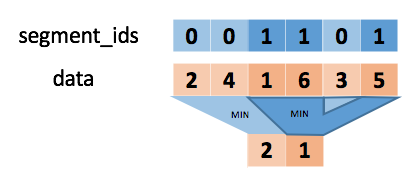mindspore.ops.UnsortedSegmentMin
- class mindspore.ops.UnsortedSegmentMin[源代码]
Computes the minimum of a tensor along segments.
The following figure shows the calculation process of UnsortedSegmentMin:
 \[\text { output }_i=\text{min}_{j \ldots} \text { data }[j \ldots]\]
\[\text { output }_i=\text{min}_{j \ldots} \text { data }[j \ldots]\]where \(min\) over tuples \(j...\) such that \(segment_ids[j...] == i\).
Note
If the segment_id i is absent in the segment_ids, then output[i] will be filled with the maximum value of the input_x’s type. The segment_ids must be non-negative tensor.
- Inputs:
input_x (Tensor) - The shape is \((x_1, x_2, ..., x_R)\). The data type must be float16, float32 or int32.
segment_ids (Tensor) - A 1-D tensor whose shape is \((x_1)\), the value must be non-negative tensor. The data type must be int32.
num_segments (int) - The value specifies the number of distinct segment_ids.
- Outputs:
Tensor, set the number of num_segments as N, the shape is \((N, x_2, ..., x_R)\).
- Raises
TypeError – If num_segments is not an int.
ValueError – If length of shape of segment_ids is not equal to 1.
- Supported Platforms:
AscendGPU
Examples
>>> input_x = Tensor(np.array([[1, 2, 3], [4, 5, 6], [4, 2, 1]]).astype(np.float32)) >>> segment_ids = Tensor(np.array([0, 1, 1]).astype(np.int32)) >>> num_segments = 2 >>> unsorted_segment_min = ops.UnsortedSegmentMin() >>> output = unsorted_segment_min(input_x, segment_ids, num_segments) >>> print(output) [[1. 2. 3.] [4. 2. 1.]]